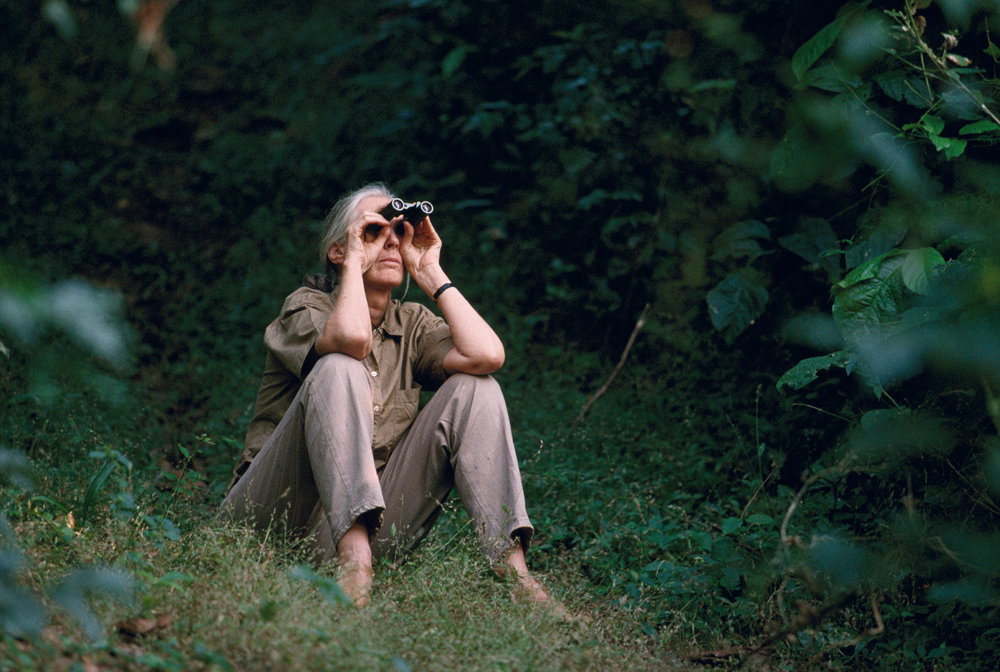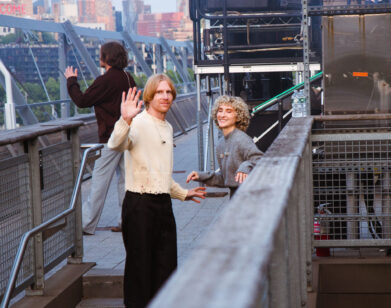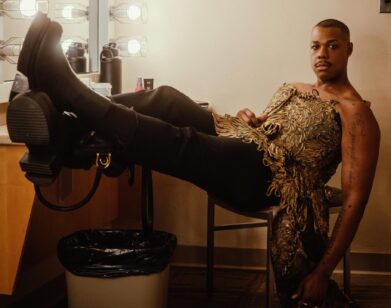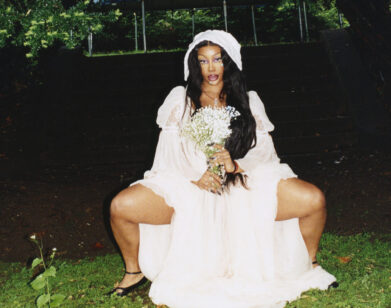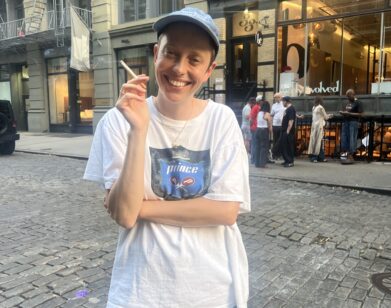Jane Goodall
I think the very fact that I was a young, attractive woman brought the National Geographic Society in . . . You know, the beauty-and-the-beast-type thing. JANE GOODALL
For more than half a century, Dr. Jane Goodall has been living and working in a world beyond borders. Whether it is with the chimpanzees in Tanzania, touring the world to raise money and awareness for her work in conservation and sustainable development, or at home in her native England, Goodall’s thought and interest and effectiveness reach across our often arbitrary thresholds of nationality, race, religion, ecosystems, and even species, to help broaden our understanding of one another and to deepen our connection with the whole. Since her landmark finding in 1960 that chimpanzees are able to make and employ tools in much the way we do, Goodall has expanded her scope and her influence by making that very interconnectedness the subject of her work. This holistic approach—weaving together projects to protect great apes and the ecosystems they depend on with initiatives to bolster the societies living among them, for example—which is at the core of her Jane Goodall Institute, and its youth-focused program, Jane Goodall’s Roots & Shoots, has helped to pioneer our new way of thinking about conservation and preservation, and encouraged our belief in the possibility of achieving a greener, cleaner future.
Born in London and educated at Cambridge University’s Newnham College, Goodall was, she says, always destined to work with animals and the natural world—it was her beloved dog that first showed her the way—and still she brims over with enthusiasm and joy for her work. Shortly before her 82nd birthday, Goodall spoke with another icon of conscientiousness, the actress and activist Jane Fonda, about her struggles and successes, and about how we are to escape a sixth extinction.
JANE GOODALL: Two Janes! How lovely to hear your voice.
JANE FONDA: Where are you?
GOODALL: I’m actually in England, at my family house. I just got back from Holland, Abu Dhabi, and Tanzania. And I’m gearing up for this dreaded two solid months touring in North America.
FONDA: Yeah, I know what you mean by “dreaded.” [laughs] I don’t know how you do it.
GOODALL: I only do it because I feel I have to. Otherwise, I certainly wouldn’t do it.
FONDA: Yeah, why live? But people say, “What does she do when she’s not doing all the traveling?” But your work is really your life, right? It’s not like work.
GOODALL: It’s actually harder when I’m here, because I’ve got so much catching up and writing to do. But then I do get a walk with the dogs and a fire in the evening with [Goodall’s sister] Judy, so that’s nice.
FONDA: Yes, that makes a difference. Do you remember when we first met? It was in the early ’80s. It was a luncheon in a small restaurant in Santa Monica, right?
GOODALL: And Mom was there.
FONDA: Kirstie Alley was there. And I remember you spoke about the parenting skills of mother chimps, and I realized that I had a lot to learn from the chimps.
GOODALL: [laughs] Mostly they’re okay mothers. There are a few who are very bad, and that’s usually the last born with no young sibling for her to practice on. At that lunch, I remember I told the story about the chimp named Old Man who was rescued from medical research and lived with three females on an island with Marc [Cusano], who was looking after them. Marc gradually got to be friends with Old Man, although he had been told he’d kill him, that he hated people. Then, one day, Marc frightened the baby accidentally—he slipped and fell, and the baby screamed, and the mother raced over and bit deeply into his neck. The other two females rushed to help their friend. So here is Marc, thinking, “I’m going to die.” But actually, Old Man, who was so protective of the baby, pulled those three females off and kept them away while Marc dragged himself to safety. You know, if a chimp who has been abused horribly by humans can help a human friend in a time of need, how much more should we help the animals—and other people for that matter—in their time of need? I remember telling that story because it always made my mother cry, and she said that that lunch was the only time she didn’t cry, because all the ladies were going off to some other function after lunch, and they all, one and all, put napkins up to stop their mascara running. [both laugh]
FONDA: You tell so many stories that make people cry-out of astonishment, not sadness. Also, the awareness that if we paid more attention, we’d have so much to learn from these animals that are so much like us.
GOODALL: And think of what we’re doing to the elephants and the rhinos and the lions. And now in the dear old U.S., they’re about to delist grizzly bears [from Endangered Species Act protection]. We have to stop it. We have to get people to sign a petition to the Fish and Wildlife Service.
FONDA: We’ll get Ted Turner involved in that because he loves the grizzly. He has grizzlies on his ranch. And wolves. He brought the wolves onto his ranch. Anytime he ever talked to you on the phone, in the 10 years I was married to him, he’d make chimp noises. “Oh, he’s on the phone with Jane!” [laughs] So tell me, when you were growing up, what was it that first got you interested in animals and the natural world?
GOODALL: I was born that way. I mean it. When I was one and a half, my mother found I had got a whole lot of earthworms in bed with me, and I was watching them. She said, “You look as though you wondered how they walk without legs.” I had this wonderful, supportive mother who didn’t get mad because of all the earth mucking up my bed. She just said they’d die—they needed the earth. And you know the wonderful story of me hiding and waiting for over four hours to see the hen laying the egg, and the police almost being called because I had disappeared. Again, Mom wisely—instead of getting mad at me—she saw my excited eyes and sat down to hear the wonderful story of how a hen lays an egg. Oh, she was amazing. She’s the one who found books for me to read because we had no TV back then. When we were kids, we had very little money. Most of our clothes and all the books were secondhand or from the library. And it didn’t matter. From about 13 on, my best friend came into my life, my dog Rusty. Honestly, Jane, he was sent into my life to teach me things. He wasn’t even our dog. He lived in a hotel down the road, and he came every morning at 6 a.m. to be let in, went home for lunch, and stayed until we turned him out about 10 at night. And the owners knew, but they didn’t care two hoots.
FONDA: What did he teach you?
GOODALL: He taught me that animals have personalities and minds and emotions, when, at that time, science said only we did. Later, I was chastised for talking about the chimps like that. But Rusty had already taught me when I was a child.
FONDA: You’ve heard stories of the dog sitting by the window, and the owner will be miles away coming back from work, but the dog knows the car is coming and sits by the window—things like that.
GOODALL: That was scientifically proved by Rupert Sheldrake. He did many tests of it, and some of them were video taped. The owner would go out, and would have no knowledge of how long they’d be away. Then they’d be told to go home at a randomly selected time. And about 11 seconds after the owner was told to go home, the dog would calmly get up and sit by the window to await their owner’s return. He said cats knew as well, but cats basically didn’t care, so it didn’t work very well for them. That’s why vets mostly won’t make an appointment for a cat, because if there’s an appointment, the owner can never find the cat. [both laugh]
FONDA: Amazing. Let me ask you something. When you went to Africa the first time in ’57, did you go in order to meet up with Richard Leakey?
GOODALL: No. I went because I was invited by a school friend. Richard was only 13 or something, so I didn’t even go to meet his father. It was his father who was my mentor, but I hadn’t heard about him before I went. I heard about him when I was there. Somebody said, “Jane, if you’re interested in animals, you should meet Louis Leakey.”
FONDA: So it was quite a trip.
GOODALL: Ha, yeah. I went on a boat. That’s how you went in those days: by boat. Went around the Cape of Good Hope just because the Suez Canal was closed, because we had the war with Egypt. My friend invited me for a holiday. And then I got a job, just a boring old secretarial job, but then I heard about Louis and went to see him, and he gave me a job, just like that, as his sort of secretarial assistant.
FONDA: Did you go into the field with him?
GOODALL: I went to Olduvai, and that was before anybody knew about it. No human remains had been found yet, so for me, it was perfect. All the animals were there then. There was no road to Seronera from Ngorongoro; it was just a very rough track.
FONDA: And how did that lead you to study chimpanzees in Tanzania?
GOODALL: Leakey had always been looking for somebody that he felt was right, and I think the day he decided that I was that person was when Gillian [Trace] and I were allowed to go out on the plains after the hard day’s work, just us. On this one occasion, we met a young male lion, about two years old, and he was curious and followed us, which was a bit scary but extremely exciting. I think it was that evening around the campfire when I was talking about what I had decided we should do that Leakey decided that I was the right person.
FONDA: What did you decide to do?
GOODALL: Well, down at the bottom of the Olduvai Gorge, which is where the fossil sites are, there’s thorny vegetation. Up at the top, it’s the grass of the Serengeti Plains. So when I saw this lion behind us, Gillian said, “We should hurry and get into the thicket.” And I said, “No, because we won’t know where the lion is, and he’ll know exactly where we are. We should climb up onto the open plains.” And that was the right choice.
FONDA: And that’s when he realized that you were the right person.
GOODALL: Yes. [laughs] So I first got to Gombe in 1960, and I saw a chimp quite early, but in the distance. It took eight, nine months before I could get even reasonably close. Fortunately, one of them, David Greybeard, the one who first began to lose his fear, showed me tool—using and toolmaking with his termite fishing.
FONDA: Had anyone else known about that before?
GOODALL: Not in the wild, no, because nobody studied them in the wild. Up until then, we were defined as “man the toolmaker.” So, of course, the scientists were all very eager to prove that I hadn’t actually seen it. Everything I did, the scientists didn’t like.
FONDA: How much was your gender a part of that?
GOODALL: Oh, I’m not sure. It was mainly because I was talking about the chimpanzees with names and personalities and emotions, which wasn’t done in the scientific world back then.
FONDA: Well, I will wager that the fact that you were a young, attractive woman didn’t help.
GOODALL: Well, look, I wasn’t trying to be a scientist. I only ever wanted to be a naturalist, like a David Attenborough. Louis Leakey made me get a degree, which I’m now glad about because it certainly helped. But I think the very fact that I was a young, attractive woman brought the National Geographic Society in, who funded things after I’d seen the tool-using. You know, the beauty-and-the-beast-type thing. So I actually found it helpful. And then I found I loved the science part of it. I loved collecting data, and being able to analyze it really helped me, but that wasn’t my goal when I set out. By that time, I was hooked, and I knew I had to go on getting money to find out about the chimps. I was by then committed to chimps. When I got to Gombe in 1960, the forest curled all the way from southwestern Tanzania around the lake through Burundi, Rwanda, Uganda, and into the Congo Basin and West Africa—it was unbroken. And there were probably between one and two million chimps. The onslaught on the African forest had not started. Now Gombe is a little island surrounded by hills that were totally bare by 1991. The land had lost its fertility and the people were cutting down the last trees to try to grow food because they were so poor. And that’s when I realized if we don’t help the people, we can’t even try to save the chimps. Since we’ve begun our program helping the people, the chimps have more forest. Another misconception: You can’t do everything. You can’t do health and forestry and agriculture. You’ve got to focus and do one or the other. We’re saying, “But what’s the point of educating a child if they’re going to die because they don’t have proper hygiene and they’re going to get diarrhea?” The holistic approach to us seemed the only one. Finally, the EU agreed to give us what for them was a very small amount of money, and the program is now in 52 villages. We’ve been able to introduce water conservation, restoration of the steep slopes, programs particularly important for women, microcredit for environmentally sustainable projects—
FONDA: Why mostly women?
GOODALL: Because if you do microcredit with men, they tend to quickly drink it. They don’t pay you back. We’ve had something like 93 percent of all money loaned to the women over the past, I think, 13 years, paid back. And we also managed to get some money for scholarships to keep girls in school because, if you educate women, family size tends to go down. And we have family planning information, which is very well received.
We all matter and we all make a difference. We get to choose what sort of difference we make. Jane Goodall
FONDA: It doesn’t sound like you focused as narrowly as they said to do.
GOODALL: No, we went more and more holistic, and now people have realized that’s the way to go.
FONDA: So it’s health, it’s education, it’s empowerment of women.
GOODALL: Exactly. Agriculture, reforestation, water projects. And the forests have come back.
FONDA: So has your work become a template for others in other countries of Africa?
GOODALL: We’re hoping so. We want to scale it up. We’re not possessive because it’s working and it’s saving the environment and it’s helping people lead better lives.
FONDA: And it’s reducing the population. One thing you and Ted Turner have in common is the understanding that population growth is a major problem.
GOODALL: One of three major things that combine together. The second is this desperate poverty where you have to cut the trees down either to grow food or make charcoal. And then there’s us: the consumer society, the materialistic people—we all have more than we need, right? And it’s not going to be this generation—yours and mine—that makes the big change. But that’s why I’m passionate about my youth program Roots & Shoots. Back in ’75, when we first started talking about the Jane Goodall Institute, chimp research was all that was going on. I thought, “Well, I don’t want this institute just for research; I want it for conversation and education, and not just chimps but primates and then, in brackets, ‘other animals, too.’ ” Now with Roots & Shoots, every group of young people—we’ve got about a hundred thousand groups in 140 countries—chooses three projects in their communities: one to help people, one to help animals, one to help the environment. Or they can do all three in one. And the thing that crept in, which never was written into it at the beginning, was learning to break down the barriers between people of different nations, religions, cultures, and helping young people understand that we may have a skin of a different color, but we all have hearts that beat, and we cry, and we laugh, we fall in love. Underneath the color of the skin and behind the culture, we’re all human beings.
FONDA: When you spoke to school kids at the Atlanta Zoo, I watched the faces of the young people listening to you. I could see the impact that you have. It’s just so moving.
GOODALL: This is why I have to do what I do.
FONDA: There is a video you recently posted of when you released an orphaned chimp, and she hugged you.
GOODALL: Yes, Wounda. Well, Wounda had nearly died. Rebeca [Atencia], the veterinarian who’s in that film, saved her life. She did a blood transfusion, which hadn’t been done before in Africa. We have these islands now in Congo, and Wounda, having recovered, was going to join the chimpanzees being put onto the islands. I hadn’t met her till that day. She was in her traveling cage, and I went to meet her with Rebeca before we set off—first by car and then by boat—and talk to her. I talked to her on the boat because I thought, you know, she’s with friends, but she must be feeling what’s happening now. And then, you saw what happened. It was amazing.
FONDA: The cage door was open. And she crawled on top and wrapped her arms around you.
GOODALL: She looked all around. One of the guys patted her gently, and she looked all around, and then she just turned to me, and I mean, the embrace is longer than any of us ever remember.
FONDA: Everyone I watched it with was crying.
GOODALL: We were all crying, too. It’s really moving. And by the way, all our chimps on the islands have birth control, but Wounda had a baby. And we were all so thrilled because she’d been through so much.
FONDA: Why is there birth control?
GOODALL: Because we’ve got 62 adult chimps on the islands and another 100 adult and young chimps at the sanctuary, and they’re still coming in. We can’t afford to have babies; it’s expensive. We can’t just dump them on the island. They still have to be fed.
FONDA: How much does it cost per chimp? Tell the readers of Interview magazine. Adopt a chimp! [laughs]
GOODALL: We do have an “adopt a chimp” program [Chimpanzee Guardians]. There are several levels starting at about $20 per month.
FONDA: Your book Seeds of Hope came out in 2013. How has your story and your interaction with the world changed over the years?
GOODALL: People used to consider me “the chimp lady.” Many still do. We’re in our 55th year of research at Gombe, which is amazing. We still have a great team there, people learning new things about chimps. But my life is Roots & Shoots and raising awareness around the world, 300 days a year: the importance of saving the environment for its own sake—it’s beautiful—but also for the sake of our children and all the animals.
FONDA: You and many other great thinkers, including E.O. Wilson, Jeffrey Sachs, have talked about the world entering the sixth great episode of extinction, which is also the only one that humans have been present in. And, even in the face of the sixth great episode of extinction, you talk about the future.
GOODALL: Well, the goal is to start reversing the trend. So restoring forests, making more and more effort to save animals from extinction. But none of this will work unless the next generation looks after things better than us, and unless people understand that unlimited economic growth on a planet of finite resources is absurd. We need money to live, but we’ve got to stop living for money. If everybody starts thinking about the consequences of the little choices they make, like what they buy—where does it come from? Was it ethically produced? Then billions of people making ethical choices each day, little ones, will start to make a huge change, and people will stop being apathetic and feel instead, “I am making a difference.” We all matter and we all make a difference.
JANE FONDA IS A TWO-TIME ACADEMY AWARD-WINNING ACTRESS AND ACTIVIST. HER NETFLIX SERIES, GRACE AND FRANKIE, RETURNS FOR A SECOND SEASON IN MAY.

